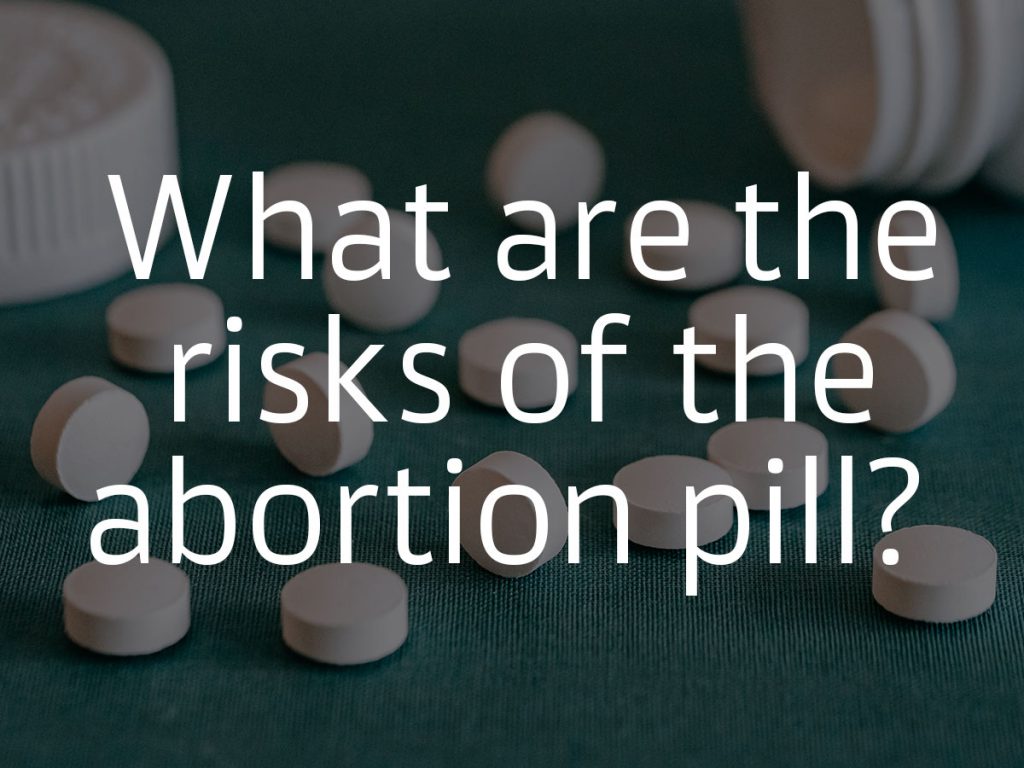 Are you or is someone you love facing an unplanned pregnancy and considering taking the abortion pill? With any medical procedure—including abortion—it’s important to take the time to do the research you need to make an informed choice.
Are you or is someone you love facing an unplanned pregnancy and considering taking the abortion pill? With any medical procedure—including abortion—it’s important to take the time to do the research you need to make an informed choice.
The abortion pill is a two-step abortion process that ends a pregnancy through chemical means. Medical abortion is an option for women within the first 10 weeks of pregnancy (10 weeks and 0 days or less from start of last menstrual cycle).
A medical abortion starts with the pill Mifepristone (RU-486), which stops the production of progesterone—a hormone created by the body to help the pregnancy develop. This first step is typically administered in a medical setting, however, the second pill, Misoprostol, is given to the woman to take at home roughly 24-48 hours after taking the first pill. Misoprostol causes the uterus to contract and expel the pregnancy tissue. With medical abortions, the abortion is typically completed at home.
Women who take the abortion pill should expect to encounter some common side effects including abdominal pain, cramping, bleeding, nausea, vomiting, and diarrhea. While these short-term side effects will usually lessen over time and disappear altogether, the abortion pill can also be accompanied by some risks that have lasting consequences.
Here are the top risks you should consider before you schedule your abortion:
Pelvic Inflammatory Disease
Women who undergo medical abortions while being infected with chlamydia are 23% more likely to develop pelvic inflammatory disease (PID).[1] PID can lead to infertility, ectopic pregnancies, abscesses, and chronic pelvic pain.
Incomplete Abortions Leading to Infection
An incomplete abortion is when there is leftover pregnancy tissue in the uterus. If left unattended, incomplete abortions can lead to hemorrhaging and life-threatening infections.
Lasting Mental Health Struggles
Unlike other serious medical procedures, medication abortion isn’t fully administered in a healthcare setting, leaving women to complete the abortion at home, without much or any emotional support and no medical supervision. Some women report experiencing “significant mental health issues that are caused, triggered, aggravated, or complicated by their abortion experience.” [2]
Fertility Issues as a Result of Abortion Complications
In the case of complications, such as infections or scarring, studies have linked the abortion pill with an increased risk of spontaneous preterm birth and fertility issues.[3]
Lasting Relationship Issues
Abortion has been linked to various relational issues such as difficulty bonding with partners and future children. Following abortions, instances of breakups and divorces increased at a rate of 40 to 75 percent and post-abortive women have reported struggling to connect with their children as a result of their abortion. [4]
Are you experiencing an unplanned pregnancy?
You’re entitled to information on each of your pregnancy options so that you can make an informed and educated decision for yourself and your future! A Woman’s Concern is here to help you navigate your options, identify resources that will be helpful to you, and provide you with a safe place to process your feelings and develop a plan that’s right for you!
SOURCES:
Westergaard L, Phillipsen T, Scheibel J (1982). “Significance of cervical Chlamydia trachomatis infection in postabortal pelvic inflammatory disease.” Obstetrics and Gynecology, 68(5): 668-90; Ovigstad E, et al. (1983). “Pelvic inflammatory disease associated with Chlamydia trachomatis infection after therapeutic abortion.” Br J Vener Dis, 59: 189-92; Heisterberg L, et al. (1987). “The role of vaginal secretory immunoglobulin a, gardnerella vaginalis, anaerobes, and Chlamydia trachomatis in post abortal pelvic inflammatory disease.” Acta Obstetricia et Gynecologica Scandinavica, 66(2): 99-102.
Reardon DC. The abortion and mental health controversy: A comprehensive literature review of common ground agreements, disagreements, actionable recommendations, and research opportunities. SAGE open medicine. 2018;6: 1–38. 10.1177/2050312118807624 . [PMC free article] [PubMed] [CrossRef] [Google Scholar]
Bhattacharya, S. et al. Reproductive outcomes following induced abortion: a national register-based cohort study in Scotland. BMJ Open. 2, (2012).
Women’s Health After Abortion: The Medical and Psychological Evidence. Paperback – April 1, 2002. Elizabeth Ring-Cassidy (Author), Ian Gentles (Author).
This information is presented as an informational tool only. It is not intended to replace medical advice or care from a qualified medical provider.


 Are you or is someone you love facing an unplanned pregnancy and considering taking the abortion pill? With any medical procedure—including abortion—it’s important to take the time to do the research you need to make an informed choice.
Are you or is someone you love facing an unplanned pregnancy and considering taking the abortion pill? With any medical procedure—including abortion—it’s important to take the time to do the research you need to make an informed choice.




